
As part of AIChE's 110th Year Celebration, this series provides perspectives on the future of chemical engineering from dozens of leaders in industry, academia, and at national laboratories.
We continue with Jan Lerou. He consults as Jan Lerou Consulting, LLC, and has served as professor of practice in the Chemical Engineering Department of Washington University in St. Louis since 2011. In 2008 he was CTO at Velocys Inc after Catalytica, following 16 years at DuPont Research and Development.
During AIChE’s centennial year of 2008, AIChE interviewed Dr. Lerou to learn his vision for the profession’s future. In today’s blog post, we contrast some of Lerou’s comments from 2008 with his perspectives today.
The increasing adoption of a multi-scale approach will facilitate conceiving new processes. The increasing understanding of the necessity of using sustainable processes will help in solving the environmental issues. The availability of ever more powerful hardware and the associated software will synergistically affect this evolution.
Looking 25 years into the future, how do you expect your industry/research area to evolve?
In 2008, Lerou wrote:
The key aspect will be the drive to replace the classical raw materials gas, oil, and coal with renewable sources for energy and chemicals. The current efforts in this area will have enough momentum this time to continue in the future, even if natural gas and crude oil prices drop. This evolution will have a major impact:
- new processes will be conceived and materialized
- the rate of adoption of new technologies by the chemical industry will increase drastically
- huge opportunities will emerge for bio and non-bio based systems.
In 2018, Lerou says:
The natural gas and crude oil prices did drop, but the development of renewable fuels slowed. As a consequence, the rate of adoption by the chemical industry increased only slowly.
Core areas of ChE expertise are being augmented by new expertise in science and engineering at molecular and nanometer scales, in biosystems, in sustainability, and in cyber-tools. Over the next 25 years, how will these changes affect your industry/research area?
In 2008, Lerou wrote:
The new core areas will accelerate the evolution mentioned above. The increasing adoption of a multi-scale approach will facilitate conceiving new processes. The increasing understanding of the necessity of using sustainable processes will help in solving the environmental issues. The availability of ever more powerful hardware and the associated software will synergistically affect this evolution.
In 2018, Lerou says:
The new core areas continue to find increasing applications, but they have not been successful in conceiving new processes.
What new industries/research areas do you foresee?
In 2008, Lerou wrote:
Most new sectors will fit between existing sectors:
- Data mining: The continuing growth of data-producing systems will require new technologies to support the extraction of useful information out of a sea of data. The problem is how to classify and visualize this information in an attractive and informative manner than the human mind can assimilate. This issue has already been identified in high-throughput experimentation activities, but will also become more pressing in the process monitoring data flood as well.
- CO2-based production of chemicals: CO2 capture and sequestration will only be sustainable if CO2 is used as a carbon source. There are already first results from converting CO2 in methanol, splitting CO2 with solar energy, etc.
- Distributed production: This methodology will allow localized production of chemicals and energy with a reasonable capital investment. This goes in the opposite direction of the economy of scale and will require a retooling of the engineer’s minds.
In 2018, Lerou says:
The three areas mentioned above are expanding quickly and will come to full fruition in the next decade.
Taking into account the ongoing evolution of the professions — including the need for new modes of education; high standards of performance and conduct; effective technical, business, and public communication; and desires for a more sustainable future — what do you think the chemical engineering profession will look like 25 years from now?
In 2008, Lerou wrote:
It will be a very exciting profession! During the next 25 years, chemical engineers will have proven that they are able to solve the key issues with which we are struggling now and that we will struggle with in the future: the environment, the energy crisis, creation of sustainable solutions, increasing the safety of products and processes, etc.
In 2018, Lerou says:
Chemical engineering continues to be an exciting profession. Now that I am retired, I enjoy following all the new developments in our domain. I am particularly delighted to see how many young professional engineers make major contributions to society.
 AIChE's 110 Year Celebration
AIChE's 110 Year Celebration
Celebrate AIChE's 110-year anniversary. Attend this Annual Meeting session, focusing on the future of chemical engineering through the eyes of thought leaders from industry, academia, and national laboratories.


